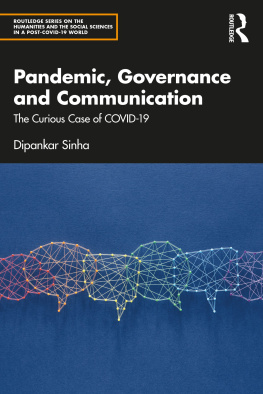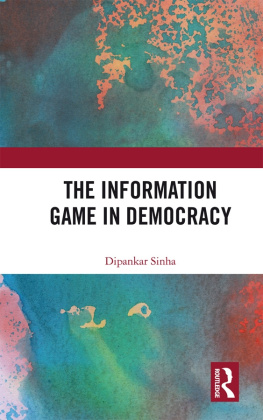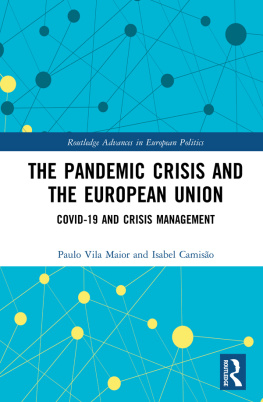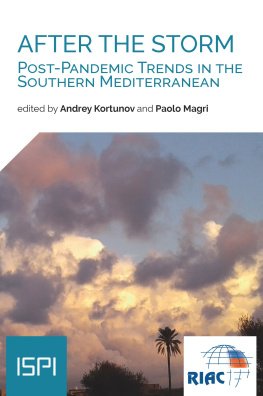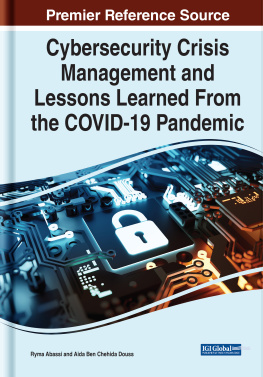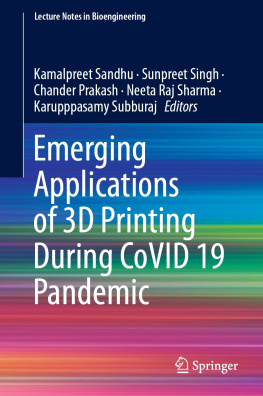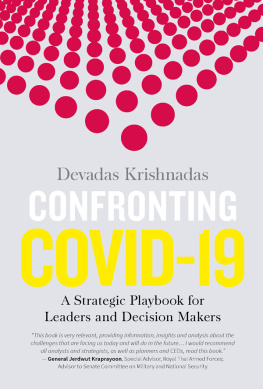Pandemic, Governance and Communication
This book focuses on what is arguably the most devastating phenomenon in the history of modern civilization, the COVID-19 pandemic.
It shows how, on the one hand, the pandemic has exposed the deficiency of governments the world over in dealing with a major health crisis; and, on the other, it also reveals efforts by the ruling forces to enforce surveillance on people to disciplining them by maneuvering cutting-edge digital technology in the name of security and safety. Second, it explores how the mainstream versions of crisis communication and risk communication face huge challenges during a pandemic. Finally, it analyses how the pandemic propels an extraordinary expansion of infodemic rapid spread of excessive quantities of misinformation and disinformation of the fake and false variety and how social media in particular becomes its main tool in causing subversion of the prevalent information order.
Engaging, comprehensive and accessible, this book will be of immense importance to scholars and researchers of politics, especially governance and political communication, communication studies, and public health management. It will be vital for public policy professionals, experts in thinktanks, career bureaucrats, and non-governmental organizations.
Dipankar Sinha is Professor of Political Science and Director, Centre for Social Sciences and Humanities, University of Calcutta, India. He is also Honorary Associate of the Centre for Media History, Macquarie University. Sinhas research mainly focuses on communicative dialectics of governance and development in the post-globalization era. He has authored six books, co-authored four and co-edited two. He has also published widely in international and national journals and edited volumes.
Sinhas most recent books from Routledge are The Information Game in Democracy (2018) and The Social Sciences in a Global Age: Decoding Knowledge Politics (2021).
Routledge Series on the Humanities and the Social Sciences in a Post-COVID-19 World
The COVID-19 Pandemic has changed our lives economically, politically, socially, and emotionally.
The pandemic has impacted around the world in terms of health and wellbeing and brought into sharp focus fault lines and continuities in our lives and societies which are likely to outlive the pandemic. In this light, the humanities and the social sciences will have a crucial role to play as we reimagine and reshape everything we know in the post-pandemic years.
This Routledge series aims to bring forward cutting edge interdisciplinary research on various facets of politics, society, economy, environment, culture, psychology, and wellbeing in the post-COVID world. The books in this series will engage with a range of topical issues that have surfaced in the wake of the pandemic, and study how these emerging trends and critical developments are likely to impact the way in which humanities and social sciences are taught, researched and understood in the years to come.
Books in this series
Democracy and Public Policy in the Post-COVID-19 World
Choices and Outcomes
Edited by Rumki Basu
Pandemic, Governance and Communication
The Curious Case of COVID-19
Dipankar Sinha
Federalism and the Response to COVID-19
A Comparative Analysis
Edited by Rupak Chattopadhyay, Felix Knuepling, Diana Chebenova, Liam Whittington, Phillip Gonzalez
For more information about this series, please visit: https://www.routledge.com/Routledge-Series-on-the-Humanities-and-the-Social-Sciences-in-a-Post-COVID-19/book-series/HSSPCW
Pandemic, Governance and Communication The Curious Case of COVID-19
Dipankar Sinha
Cover image: Getty Images
First published 2022
by Routledge
2 Park Square, Milton Park, Abingdon, Oxon OX14 4RN
and by Routledge
605 Third Avenue, New York, NY 10158
Routledge is an imprint of the Taylor & Francis Group, an informa business
2022 Dipankar Sinha
The right of Dipankar Sinha to be identified as author of this work has been asserted in accordance with sections 77 and 78 of the Copyright, Designs and Patents Act 1988.
All rights reserved. No part of this book may be reprinted or reproduced or utilised in any form or by any electronic, mechanical, or other means, now known or hereafter invented, including photocopying and recording, or in any information storage or retrieval system, without permission in writing from the publishers.
Trademark notice: Product or corporate names may be trademarks or registered trademarks, and are used only for identification and explanation without intent to infringe.
British Library Cataloguing-in-Publication Data
A catalogue record for this book is available from the British Library
Library of Congress Cataloging-in-Publication Data
A catalog record has been requested for this book
ISBN: 978-1-032-11796-6 (hbk)
ISBN: 978-1-032-16180-8 (pbk)
ISBN: 978-1-003-24738-8 (ebk)
DOI: 10.4324/9781003247388
Typeset in Bembo
by SPi Technologies India Pvt Ltd (Straive)
Dedicated to
Frontline health workers and volunteers fighting the pandemic
We survive cause you are here.
Preface and Acknowledgements
To deliberate on one of the most ubiquitous and mysterious phenomena ever faced by mankind let me begin with an apparently contradictory contention. The book was not needed to be written at all is as much true as the point that it was needed. The first contention has its rationale in the fact that we are in the midst of proliferating literature on the greatest pandemic in human history. The second contention has its logic in the fact that given the enigmatic nature of the pandemic there is always a scope to view and analyse it from varying vantage points. Let me assert that the proud human race never in its wildest imagination thought that a tiny pathogen called COVID-19 would devastate the world within a span of few weeks. Our supreme confidence that a pandemic may occur but we have made enough progress to counter it was demolished within days. The pandemic started playing havoc in a true global fashion, that too in different phases. People around the world were being hit in unusually hard ways physically eliminated, economically shattered, socially distanced and culturally shocked.
The pandemic in the scheme of this book is a curious case in a classical way because the phenomenon combines in all its subtlety and intricacy the elements of novelty, oddness, strangeness, unexpectedness and even the act of prying with an urge for inquisitiveness and exploration. However, this book has been written in a slow but steady pace. Let there be no doubt that the pandemic has led to an excessive growth of literature, many of which are basically based on a hurried glance and too small snapshots of what is without doubt a phenomenon with exceptional magnitude and layers. Thus, one has to be a little slow in understanding the nature and impact of the pandemic, especially when one notices with much alarm that even a foremost social thinker of our times, Giorgio Agamben, faltered in understanding its enormity and complexity; it is to be discussed in detail in the book. The authors location in India, which faced an unimaginably tragic situation particularly during the second strain, a double mutation Indian variant (technically called B.1.617) also required a patient understanding of the hard reality. No less so because living in Kolkata and in my home state of West Bengal, the reality was even harder because during the second wave every safety precaution was thrown to the wind by all political parties and by a large section of people, for whom the state assembly elections became more important than human lives. It was difficult to remain a detached observer while being a witness to utter helplessness all around. Nor was it easy to concentrate amidst people literally struggling for breath and dying because of lack of minimum healthcare facilities. In direct contrast to the argument that governance should be scrutinised only during the normal times and not during a grave crisis the prevailing situation strengthened my resolve to delve critically into the ins and outs of governance and its claims.

